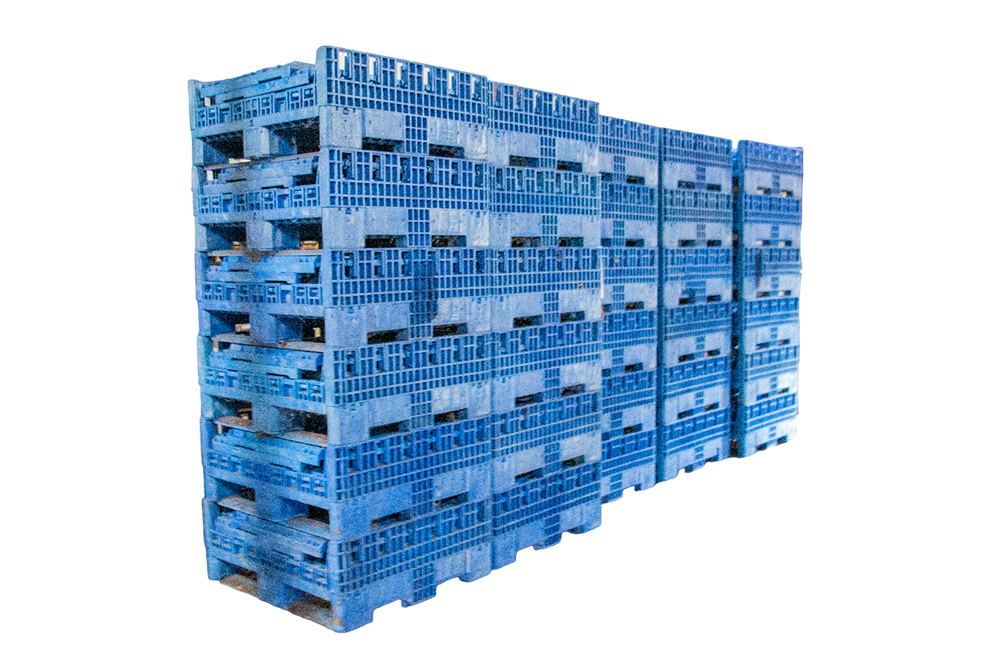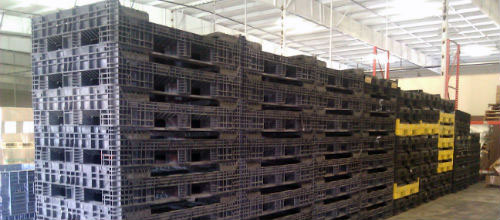Why Bulk Containers Are Important for Sustainable and Cost-Effective Transportation
Bulk containers play a vital role in modern-day logistics. They assist in the efficient activity of big amounts of goods, consequently maximizing transportation procedures. This approach not only minimizes costs yet also reduces ecological influence with reduced discharges and waste generation. As industries look for even more lasting practices, the fostering of bulk containers is ending up being progressively substantial. What implications does this shift hold for future logistics and supply chain administration?

The Advantages of Using Bulk Containers in Logistics
Mass containers revolutionize logistics by boosting efficiency and sustainability. These containers allow for the transportation of huge quantities of goods in a single journey, markedly decreasing the variety of journeys called for. This not just enhances procedures yet additionally decreases labor expenses connected with handling, packing, and discharging. Additionally, bulk containers are designed to maximize room utilization within transport cars, making sure that even more items can be delivered all at once.
The standardization of mass containers also streamlines the logistics process. With uniform dimensions, they can be quickly piled and saved, leading to improved storage facility management. Mass containers typically feature long lasting products that secure components from damage throughout transportation, therefore reducing item loss and boosting general reliability. Therefore, organizations can experience improved supply chain performance, ultimately leading to raised earnings and customer complete satisfaction. This mix of elements makes bulk containers an important asset in modern-day logistics.
Ecological Effect: Decreasing Waste and Carbon Impact
As industries increasingly prioritize sustainability, the adoption of bulk containers has emerged as a crucial method for decreasing waste and reducing carbon footprints. These containers minimize making use of packaging products, such as boxes and plastic, thus especially lowering general waste generation. By settling deliveries, mass containers enhance transport efficiency, enabling even more items to be delivered per journey. This decrease in journeys straight associates with reduced greenhouse gas emissions, adding to a smaller carbon footprint.
Mass containers can typically be recycled or recycled, better minimizing ecological impact. The toughness of these containers assurances they can withstand several transportation cycles, decreasing the demand for single-use choices. used collapsible bulk containers. By improving logistics and promoting reliable source use, bulk containers not only sustain lasting methods however likewise motivate sectors to line up with worldwide environmental goals. Ultimately, their application shows a dedication to eco-friendly stewardship and accountable source administration
Price Cost Savings: How Mass Containers Lower Transport Costs
While several firms seek ways to boost their lower line, making use of mass containers provides a substantial possibility for lowering transportation expenditures. Mass containers maximize the quantity of goods transferred, allowing companies to ship bigger amounts simultaneously. This efficiency lowers the number of journeys required, straight reducing gas costs and minimizing labor expenditures related to loading and discharging.
Furthermore, mass containers typically feature streamlined designs that maximize area usage within transportation automobiles. This implies less vacant spaces, bring about extra efficient use of readily available capacity. Additionally, the sturdiness of mass containers can lower the risk of item damages during transit, making certain and reducing losses that even more goods arrive undamaged.
Enhancing Supply Chain Efficiency With Bulk Storage Solutions
Bulk storage space services play an essential function in enhancing supply chain efficiency by optimizing supply management. By consolidating products right into less, bigger containers, services can significantly decrease managing costs connected with regular transfers and processing. This structured method permits far better tracking and monitoring of stock, eventually causing boosted operational performance.
Structured Stock Monitoring
Effective inventory management is vital for enhancing supply chain procedures, particularly when organizations take on bulk storage space remedies. These remedies enable businesses to maintain higher supply degrees while decreasing the regularity of replenishment. By settling products into bulk containers, business can simplify their supply procedures, reducing the complexity connected with tracking multiple smaller sized plans. This strategy promotes exact supply matters and boosts projecting accuracy, permitting even more informed decision-making. Furthermore, bulk storage services simplify stockroom organization, making it easier to situate and gain access to products when needed. As a result, companies can accomplish a more reliable stock turnover price, eventually enhancing overall supply chain efficiency and decreasing the possibility of stockouts or overstock scenarios.

Minimized Handling Prices
The application of mass storage options not only enhances stock administration but also considerably minimizes taking care of prices across the supply chain. By combining products into bulk containers, firms lessen the demand for regular handling and transfer in between different storage and transport devices. This method reduces down on labor expenses related to loading, dumping, and relocating smaller sized plans. Additionally, mass storage space reduces the frequency of deliveries, leading to lower transportation prices and reduced gas intake. Consequently, companies can optimize their logistics procedures, permitting a much more efficient appropriation of resources. Ultimately, decreased taking care of prices add to enhanced overall supply chain efficiency, fostering an environment that sustains both sustainability and financial stability.

Adaptability of Mass Containers Across Different Industries
Many industries have unique demands for transport and storage space, mass containers have emerged as a functional service that meets a wide variety of requirements. These containers, ranging from large bins to specialized containers, can suit diverse materials, including powders, liquids, and granules. In the agricultural industry, mass containers promote the transportation of plant foods and grains, while the food and drink sector uses them for active ingredients and completed products. The chemical market depends on bulk containers for safely delivering harmful products, making certain compliance with security policies. In addition, building and construction firms gain from bulk containers for transferring accumulations and other materials. Their flexibility includes numerous modes of transport, including trains, ships, and trucks, enhancing logistical effectiveness. This adaptability not just enhances procedures throughout various sectors yet additionally promotes sustainability by lowering product packaging waste and optimizing room in transportation. For that reason, bulk containers play an important function in modern-day supply chain administration.
Future Trends wholesale Container Usage and Sustainability
The future of mass container usage is progressively shaped by innovative materials advancement that boosts sustainability. Additionally, automation in logistics promises to enhance procedures, decreasing waste and boosting effectiveness. Embracing round economic climate techniques will better revolutionize how bulk containers are developed, used, and recycled, cultivating a much more sustainable transportation landscape.
Ingenious Products Development
As sectors progressively focus on sustainability, ingenious products development in bulk containers becomes a considerable aspect in boosting environmentally friendly transport services. Researchers and makers are checking out naturally degradable plastics, recycled composites, and light-weight metals to minimize ecological influence. These products not just decrease waste but also boost fuel effectiveness by reducing the total weight of containers. Furthermore, advancements in clever materials, which can adapt to differing conditions, boost the sturdiness and performance of mass containers. The integration of these cutting-edge materials aligns with round economy principles, promoting reuse and recycling. As the demand for sustainable techniques expands, the development of such materials will certainly play a crucial duty fit this post the future of bulk container usage in logistics and transportation.
Automation in Logistics
Substantial improvements in automation are positioned to change logistics and the utilization of mass containers, boosting sustainability in transportation. Automated systems, consisting of drones and independent lorries, are simplifying the activity of mass containers, reducing the dependence on traditional fuel-powered transportation. These technologies maximize transmitting and loading processes, enhancing and minimizing empty miles gas effectiveness. In addition, automated supply administration systems improve monitoring and monitoring of bulk containers, making certain better resource allotment and minimized waste. The integration of the Internet of Points (IoT) allows real-time data evaluation, making it possible for aggressive decision-making that aligns with sustainability objectives. As automation remains to advance, it is anticipated to drive better developments wholesale container use, eventually supporting even more lasting logistics practices and decreasing the ecological impact of transportation.
Circular Economy Practices
Improvements in automation are setting the stage for a more integrated method to round economy techniques in the domain of mass container use. As sectors significantly accept sustainability, mass containers are being created for long life and reusability. This change not only lessens waste but also enhances source performance. Business are embracing strategies such as closed-loop systems, where made use of containers are gathered, reconditioned, and reintroduced right into the supply chain. Additionally, wise innovations track container life cycles, assisting in much better monitoring and lowering environmental influence. The collaboration between makers, logistics carriers, and end-users is essential in developing criteria for lasting container use. used plastic containers. Future patterns indicate an expanding focus on products that are naturally degradable and recyclable, additional enhancing the circular economic climate's concepts in bulk transportation

Often Asked Concerns
What Products Are Mass Containers Usually Made From?
Mass containers are usually constructed from durable materials such as high-density polyethylene, cardboard, steel, and aluminum. These materials offer defense, toughness, and adaptability, making them ideal for delivering various products in various go to this site markets successfully.
How Do I Select the Right Size Bulk Container?
Picking the best dimension bulk container includes reviewing the quantity of materials to be carried, taking into consideration taking care of tools compatibility, and appraising storage area demands. Correct size guarantees performance in transportation and minimizes waste throughout delivery.
Are Bulk Containers Reusable or Recyclable?
Mass containers are often recyclable, designed for multiple journeys, boosting sustainability. Many can additionally be recycled, depending upon the products utilized. Choosing recyclable alternatives better lowers and supports environmental goals waste in transportation practices.
What Security Laws Apply to Mass Container Transport?
Safety and security guidelines for mass container transportation include conformity with the Division of Transportation standards, proper labeling of hazardous materials, architectural honesty analyses, and adherence to weight restrictions to ensure safe handling and stop mishaps during transit.
Just How Can Services Transition to Utilizing Bulk Containers Efficiently?
Organizations can transform to bulk containers by evaluating existing logistics, training personnel on handling, investing in appropriate devices, maximizing stock monitoring, and teaming up with vendors to guarantee compatibility and effectiveness throughout the supply chain.
As sectors increasingly focus on sustainability, the fostering of bulk containers has actually emerged as an essential approach for lowering waste and lowering carbon impacts. By consolidating materials into bulk containers, companies can enhance their supply processes, reducing the complexity connected with tracking numerous smaller sized bundles. As industries progressively focus on sustainability, cutting-edge products development in bulk containers arises as a substantial factor in boosting environment-friendly transport solutions. Automated systems, including drones and independent automobiles, Full Article are simplifying the activity of mass containers, lowering the reliance on traditional fuel-powered transportation. Additionally, automated supply monitoring systems boost monitoring and monitoring of bulk containers, making sure better source appropriation and reduced waste.